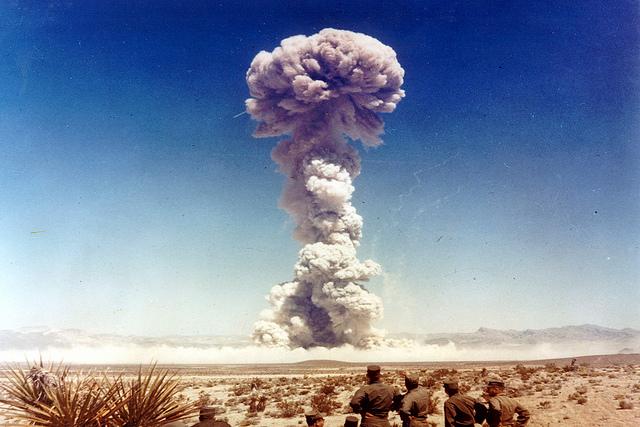Recent reports that the Obama administration has begun pursuing US Senate approval for ratification of the Comprehensive Test Ban Treaty don’t sound entirely credible. It might be that the administration wants to flag the issue as ‘unfinished business’. A US official suggested as much in a recent speech, observing that the administration was focused on ‘an open dialogue, rather than a timeline, to refamiliarize Senators with the Treaty’. But we’re only a year out from a presidential election. And it would be courting disaster to resubmit the treaty for the Senate’s ‘advice and consent’—it was rejected in 1999—unless the administration was sure it would pass.
Why are constraints on nuclear testing so contentious? Back in the 1980s and 1990s, the debate about testing was especially lively. Advocates of continued testing argued that it contributed to four technical objectives: modernisation of the arsenal, improved safety and security of warheads, stockpile reliability, and a better appreciation of weapons effects. Critics of testing argued that it contributed to the relentless progress in weapons development, harmed the environment, and made proliferation easier for new nuclear weapon states.
Believers can be found on both sides of the argument. And for those people, the decision’s about politics as much as it’s about technical factors. Some think that retaining a right to test retains an important capacity both to signal determination to an adversary and to respond to a sudden technological shift. On the other side of the argument, some say that ratifying the CTBT now signals a renewed commitment to the ageing framework of international arms control.
Do actual tests still matter? True, in the advanced nuclear weapon states computer simulation now allows ‘virtual testing’. But not all nuclear weapon states have equal access to those simulations, nor to the material data upon which they are based—and nor would we want them to. If North Korea could enhance and miniaturise its warheads without further testing, the gains from a test ban would be less clear cut. In short, there’s an irony in steadily-improving simulation techniques: the more they improve and spread, the less valuable a ban on actual tests. It was frequently argued during the 1990s that a CTBT would ‘lock-in’ Western technical advantages in nuclear weapon design, for the simple reason that the US had conducted more nuclear tests than anyone else. That argument’s still true, but weakening as other countries’ simulation models improve.
Today’s advocates of CTBT ratification are especially keen to put to work the global seismic verification system that’s been built since the 1990s. They see this as a solution to the traditional problem of verification that dogged test-ban worries in the 20th century. Then, small nuclear tests were seen as especially problematic. I can remember one suggestion at the time that the CTBT should permit any nuclear detonation which could be safely contained in a sealed above-ground container, for the simple reason that such tests would be exceedingly difficult to detect—unless, of course, they burst the container.
Decoupled tests—in which nuclear devices are detonated within a previously excavated underground cavity—were also of concern. US anxieties on that score go way back to the mid-1960s, when the Americans conducted a series of nuclear and chemical explosions at the Tatum salt dome in Mississippi. Today’s global seismic system probably offers better capabilities against really weak seismic signals, but I’m not sure it’s ever been tested against a country working actively to conceal a nuclear explosion. The North Koreans made few efforts to conceal their tests. And the Indians and Pakistanis wanted to advertise their nuclear status with their 1998 tests.
Australia has long been an advocate of a CTBT, driven in part by its own experience as a nuclear test site for the British program and its consciousness that the Pacific seemed to bear the brunt of the early-US and late-French testing programs. But the CTBT hasn’t featured much in Australian arms control thinking since 1999, when the treaty failed to attract US Senate approval last time around. Not surprisingly, the post 9/11 world has offered a variety of distractions. And meanwhile, the signatories of the treaty have abided by their commitment not to test, so at least some of the benefits of the treaty have been available without having to jump the most difficult hurdles.
Still, the treaty hasn’t yet entered into force. And it won’t do so anytime soon; not until the 44 countries specifically identified in Annex 2 as ‘nuclear-capable’ have all signed and ratified the treaty. Only 36 have done so. Five of the 44—the US, China, Israel, Egypt and Iran—have signed but not ratified. Three—Pakistan, India, and North Korea—haven’t even signed, and it’s possible all three have deliberately chosen to keep open the possibility of a return to testing.
So, are we about to embark on one more crusade to conclude a CTBT? Well, a slow-motion effort certainly seems to be under way in Washington—an effort intended gradually to put the issue back on the agenda. But it’s hard to see much happening soon. And getting the US Senate on board is only one of a number of challenges.
